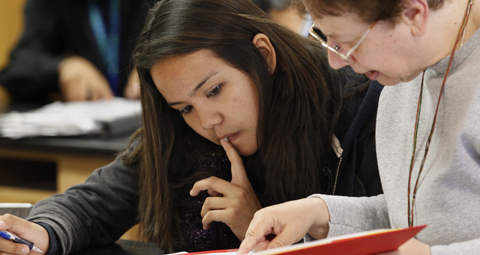June 13 | ![]() 0 COMMENTS
0 COMMENTS ![]() print
print

First principles in Catholic education
Debates over the role of Catholic schools in a pluralist society continue to spread over the online and print media.Continue Reading
Debates over the role of Catholic schools in a pluralist society continue to spread over the online and print media.
We are all aware of the various lines of thought woven through such interventions. It is important, however, to resist the ever-present temptation to shut our ears to what other people are saying and enclose ourselves in bubbles with people who share our views.
Of course, we all need the support of people who share our vision of education. Nonetheless, it goes without saying that Catholic educators should welcome any opportunity to re-present the Catholic vision of education to those willing to enter into dialogue.
Consideration
To do this successfully, we need to step back a little and give serious consideration to what we mean by the term ‘Catholic education’ if it is not to be understood as synonymous with ‘schools for Catholics.’
In this article I suggest that our distinguished educational traditions demand that we represent Catholic thinking on education as a gift to wider society. What does this mean?
In the first place, Catholic thought holds that each human person is made in the image and likeness of God. In this way of thinking, God is not a remote inaccessible figure but a God of love, incarnated in Jesus Christ and present in His Church.
This sets us apart from the prevailing mindset of Moral Therapeutic Deism (MTD) which a number of contemporary researchers have identified as central to the world view of many young people in the West.
The life of God
Following this, a Catholic understanding of education is centred on grace-filled participation in the life of God.
Although humanity is wounded by what we call Original Sin, God’s grace allows each person to seek wholeness.
Education is, essentially, the means by which human flourishing is nurtured in the context of our eternal destiny.
Education, hence, is the responsibility of the family with the assistance of the wider community.
Catholic virtues
The three theological virtues (Faith, hope and charity) sit alongside the four cardinal virtues (prudence, justice, fortitude and temperance) as the bedrock of this mission.
The school with a Catholic ethos brings the light of the Gospel to society, seeking to develop people of sound character and virtue who are able to discern the right course of action in all circumstances.
As noted above, it is a service to the wider community and a portal to Faith.
In a noteworthy address to the Gravissimum Educationis Foundation (June 25, 2018), Pope Francis reminded the Church of the importance of Catholic education both for the life of the Church and the health of society:
We are called not to lose hope, because we must offer hope to the global world of today.
‘Globalising hope’ and ‘supporting the hopes of globalisation’ are basic commitments in the mission of Catholic education, as stated in the recent document of the Congregation for Catholic Education Educating to Fraternal Humanism.
Hope and vision
A globalisation bereft of hope or vision can easily be conditioned by economic interests, which are often far removed from a correct understanding of the common good, and which easily give rise to social tensions, economic conflicts and abuses of power.
We need to give a soul to the global world through an intellectual and moral formation that can support the good things that globalisation brings and correct the harmful ones.
Pope Francis then offered three important criteria for reflection on how we articulate and promote the mission of Catholic education: identity, quality and the common good.
This tripartite approach presents Catholic educators worldwide with an evaluative structure through which to refresh their mission and method. I offer below some suggestions to help us along the way.
IDENTITY
Do we see the interdependence of Faith and reason in the construction of educational programmes centred on the true, the good, the beautiful?
Is there an integrated sacramental vision of reality with all aspects of creation regarded as signs of God’s presence among us?
QUALITY
How well do we promote a positive vision of the human person and society, encouraging all in the common good?
To what extent do we see each person as a steward of creation and knowledge, guarding our inheritance as a treasure for successive generations?
COMMON GOOD
Do we have a special commitment to working with the poor and those excluded from the mainstream of society?
Do we value the classic liberal traditions of education as means to human flourishing and the development of a functioning and participatory democracy?
To conclude, Church teaching on education is a treasure awaiting discovery.
Careful systematic study of this body of knowledge offers us insights which should encourage us to have fruitful dialogue with those who have other ways of understanding the nature of the human person and the processes of education. This is a great moment in time.
Carpe diem.









